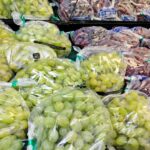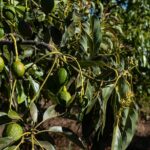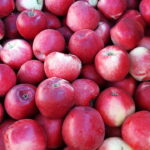Chilean fruit exports down 3% over past five years

The Chilean fruit export industry experienced a 3% decrease between 2017-18 and 2021-22 as the country is seemingly losing ground to Peru, according to agro exporter company Utilitas and as reported by La Tercera.
Shipments of all major agricultural products have experienced significant drops, with citrus fruit being the most affected, the publication said.
In the past five years, clementines have recorded the highest fall, with 34% less exports registered. Lemon and kiwifruit follow at 26% and 25%, respectively.
Apples had a drop of 23%, while grapes, one of the most popular Chilean agricultural products, also recorded a 17% drop in exports.
Peaches reported a 14% decrease, while pears and avocado declined by 10% and 9%, respectively. Blueberries saw a 3% fall.
"We have a slightly smaller industry than we were 5 years ago. While we cannot generalize the results, we can say that we have profitable species such as table grapes, cherry and citrus, and others that are not," Utilitas CEO Rodrigo Manasevich was quoted saying.
The executive called on producers to consider uprooting underperforming varieties and turning to other, more profitable crops.
Related articles: Peruvian avocado exports to U.S. could nearly double by 2028
However, Chilean cherries continue to excel in the country’s portfolio along with mandarins, with a 91% rise in exports each.
Fruits that did enjoy growth are oranges (2%), nectarines (26%) and plums (31%).
Manasevich said that, without the huge success of the cherry industry, the country’s fruit export industry would have fallen by 10%.
On the other hand, he said that the industry has experienced an "exaggerated increase in shipping rates, maritime transport, which naturally hits our results", being precisely the cherries the ones that are currently paying the highest rates.
In the last five years, the lowest rate reached was $7,200, and the highest was $15,519, showing an increase of 115%.
"In the case of maritime rates, they are falling sharply. As a result of their success, the shipping offer we are going to find in the future will be greater. With more competition we will have lower rates and we are noticing this in citrus," he said.
But the cost reductions, according to the businessman, have not yet materialized, so good results cannot be expected in, for example, cherries and blueberries.
"They are going to be regular, they are not going to be good news. They are not going to be enough to overcome the problems of previous years," he explained.
But there are other challenges specific to the industry such as unpaid debts, financial weakness and the reduction of commercial windows as a result of global competition, which generated worse results for Chile, according to Manasevich.
"We are at a brutal disadvantage in relation to Peru" he warned, adding that "Peruvian blueberries and table grapes are preferred. Fruit that has no condition problems and we continue to send fruit with condition problems."
He also emphasized that the industry is facing the "change of ownership that traditional exporters are undergoing. They are being sold and this is going to change our industry".













































